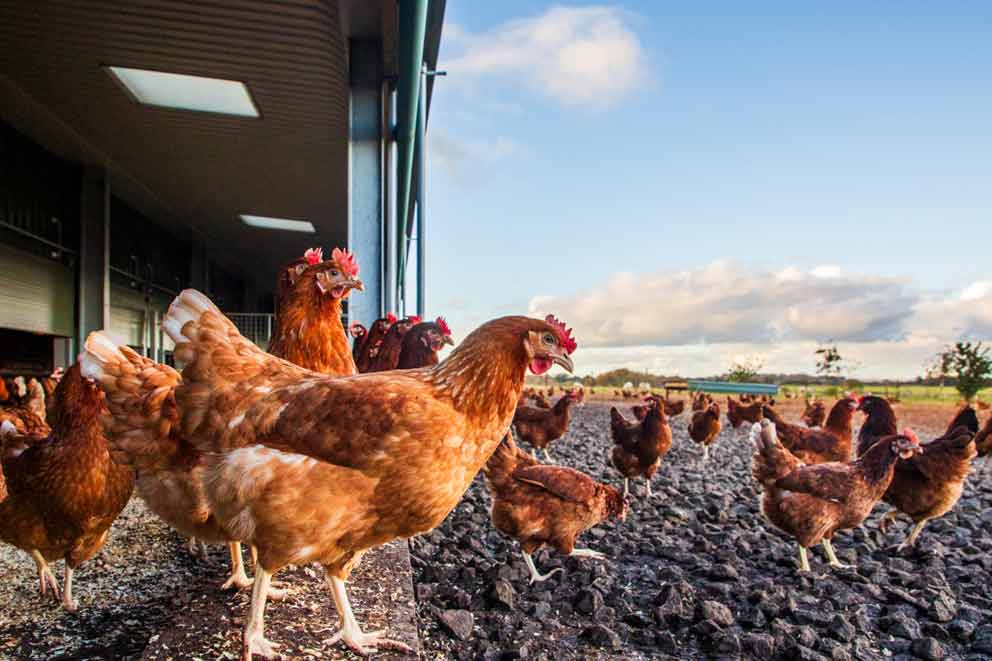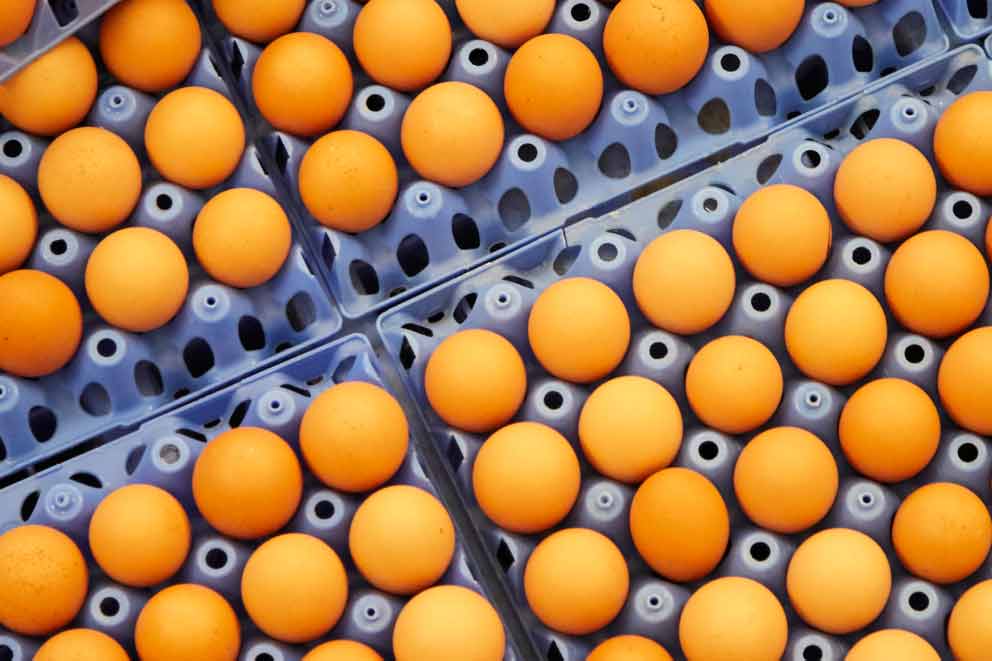We want to see all laying hens kept in well-managed free-range or barn systems instead. We're working very hard to try to improve the conditions in which all laying hens are reared, transported and slaughtered/killed, and to get better laws to protect them.
Read below about what hens need, welfare issues around their living conditions, and how we’re working to improve their lives. We also explain how you can make a difference by choosing not to buy eggs from chickens kept in battery cages.
You can also find out more about how commercial egg-laying hens are reared.
The behaviour of laying hens
Hens are naturally inquisitive animals. They have a strong desire to carry out their natural behaviours, which include the following.
- Dustbathing – this helps them remove parasites, keeps their skin and feathers in good condition and helps keep their body temperature comfortable. Birds can spend a lot of their time dustbathing each day and it's important for their physical and mental wellbeing.
- Perching – hens like to roost on perches at night with their flockmates. In the wild, this behaviour protects them from predators and also helps to conserve body heat.
- Exploring – hens like to explore their surroundings, for example by pecking at objects and scratching at the ground to unearth things in the soil.
- Nesting – hens look at different places to find a suitable, enclosed nesting site before starting their pre-laying behaviour and finally laying an egg.
- Comfort and grooming – these include feather ruffling, head scratching, body shaking, wing stretching and flapping.
- Vocalisation – when hens aren't provided with access to something they need, such as a nest site or appropriate dustbathing material, they often make more noise out of frustration. Sometimes they produce a specific sound known as a 'gakel-call'. Hens also vocalise to communicate with their flockmates, for socialising and as a warning.
We believe that all hens should be kept in environments where they're able to perform these important behaviours.
Welfare issues of laying hens
We're concerned about the welfare of laying hens in all farming systems. Here's more on why.
Battery cages
Enriched cages consist mostly of wire mesh and provide limited facilities for hens to perch, nest and scratch. We're particularly worried about the fact that cages:
- Don't allow birds to move around freely and exercise
- Don't allow birds to rest undisturbed
- Don't allow for full dustbathing and foraging behaviours.
Not providing for the full behavioural and physical needs of hens can cause frustration and suffering. Find out more about banned conventional battery cages and these enriched or 'colonial' cages.
Non-cage systems (barn and free-range) provide higher standards of welfare compared with cages. Well-designed, well-managed systems – with perches, nest boxes, floor litter and enrichment objects – allow hens to perform their natural behaviours.
Injurious feather pecking
Feather pecking is where hens peck and pull at the feathers of other hens, sometimes leading to serious injuries and even cannibalism. It can affect hens in any system and outbreaks can happen suddenly.
Injurious pecking is believed to be a redirected foraging behaviour. The reasons behind it can vary, but include:
- Environment
- Breed
- Nutrition
- Poor health and diseases
- The way hens were reared before they began laying eggs
- Sudden changes in things such as their feed or environment.
Beak trimming
Beak trimming, sometimes called 'beak tipping', is often carried out on chicks to reduce the risk of feather pecking injuries in later life. In the UK, beak trimming may only be carried out using infra-red technology, except under specific circumstances.
We’re disappointed that the serious welfare problems caused by injurious pecking and cannibalism can currently only be fully avoided by trimming beaks. We continue to work with all sectors of the industry, including rearing, breeding and research scientists, to help find an alternative. That way we can achieve a ban on routine beak trimming of laying hens at the earliest possible opportunity.
Working to help laying hens
We're working in many different ways to improve the welfare of laying hens at all stages of their lives. Here are some of the things we're doing.
Pushing for stronger laws to protect laying hens
We take every opportunity to stress the need to ban all cages and highlight the advantages of keeping hens in well-managed, higher-welfare systems such as barn and free-range.
Campaigning work
We've been campaigning for many years to have eggs from caged hens clearly labelled to allow consumers to make an informed choice about which production system they support when they buy eggs.
Since 2004, the law has required all eggs and egg boxes to be labelled according to the method of production – either eggs from caged hens, barn, free-range or organic. We urge retailers to make sure their labelling is clear, and that all products containing eggs as ingredients are also labelled as eggs from free-range, barn, organic or caged hens.
Developing RSPCA welfare standards
We have developed detailed welfare standards for laying hens and pullets (young chickens), which contain requirements to ensure that higher standards of animal welfare are met at all stages of the hens' lives. Our RSPCA standards don't allow hens to be kept in cages and are much more detailed and strict than minimum legal requirements.
The vast majority of free-range eggs in the UK come from hens inspected to these standards through the RSPCA Assured scheme. Find out more below.
Using scientific research to improve laying hen welfare
Scientific evidence is very important when we're trying to find practical solutions to laying hen welfare problems, which can be very complex.
Choosing cage-free eggs
If you're worried about the welfare of the hens who laid the eggs you buy, here's how you can help.
Look for the RSPCA Assured label on egg boxes
Please choose eggs labelled with the 'RSPCA Assured’ logo. RSPCA Assured eggs are produced by cage-free hens reared on farms inspected to our strict welfare standards. If you can't find the RSPCA Assured label, make sure the eggs you buy are labelled barn, free-range or organic.
The cost of choosing eggs from higher welfare systems compared to battery cages can be a matter of a few pennies – a small price to pay for a better life for hens. Here are other ways to exercise your buying power.
Egg box labels
The law requires all eggs and their boxes to state how the hens who laid the eggs were kept: free-range, barn, organic or cage. These terms – and particularly 'eggs from caged hens' – are sometimes in small print on the back of the box, so look carefully. Be aware that egg boxes labelled 'Farm Fresh' or 'Healthy Living' could still be from caged hens, so still check for the legally required method-of-production label.
Check the egg
Loose eggs have to be stamped with a code. The first number tells you how the hens were kept. 0 means organic, 1 means free-range, 2 means barn, and 3 means cage.
Eggs as ingredients
Eggs are used as ingredients in prepared food, including ice cream, mayonnaise, cakes, quiches and sandwiches. Legally, none of these have to be labelled with how the hens that laid them were kept. However, foods made with cage-free eggs will often feature the information clearly on the packaging or in the ingredients list.
Many supermarkets offer their own-brand cage-free-egg food. Marks & Spencer, Waitrose, Sainsbury’s and Co-op only use cage-free eggs in their own-brand ranges.
If the labelling isn’t clear, please check with the retailer or manufacturer.




